Starting from 4 to 6 months of age (depending on whether the child is on the GV and IW), the child needs additional food, in other words, in feeding. Quite often, young and not yet experienced in matters of feeding moms are lost. This is especially true of the question of when you can start giving your baby not only vegetables, fruit puree and juices, but also when you can begin to feed the baby with meat. Meat mash for the first complementary foods must be carefully selected, or cooked according to certain rules, meat is the main supplier of protein, calcium, phosphorus for the rapidly growing organism of infants, therefore the choice of meat (or ready-made baby food from meat) must be approached with great responsibility.
From what age to introduce meat lure
As for the optimal period for introducing meat supplements into the child’s diet, the opinions of experts are divided: some believe that meat can be given starting from 4-6 months; others are convinced that a more favorable input period is 8-9 months.
According to the Russian National Program aimed at optimizing the nutrition of children in the first year of life, meat puree should be entered from 6-8 months of age. It is at this age that the infant's body needs protein and a number of other trace elements contained in meat (potassium, iron, magnesium, phosphorus). The timely introduction of meat products into the children's menu contributes not only to the enrichment of the child’s body with the necessary elements, but also to its harmonious development.
However, the introduction of meat into the diet of a child depends on several factors:
- individual features of the development of the baby;
- the physical development of the infant, its growth and weight;
- type of feeding (breast or bottle feeding).
So, children who are on bottle feeding, need an earlier introduction of complementary foods, whether it is juices, fruit, vegetable or meat puree. Babies who are breastfed receive the necessary macronutrients along with breast milk. Therefore, the introduction of complementary foods for them can be postponed for a couple of months.
Rules for introducing meat into the diet of a child
Meat mash for infants is introduced after vegetable / fruit mash, after juices and cereals.
Before offering meat supplements to your baby, it is advisable to familiarize yourself with some of the rules of the first feeding:
- Meat (like any other food) should be given only to a healthy child.
- It is advisable to refrain from introducing complementary foods in the following cases:
- if the child has been vaccinated or vaccination is expected soon;
- during the summer heat;
- if the baby is sick or naughty.
- A new product should be introduced no earlier than 2 weeks after the introduction of the previous product into the child's diet.
- The volume of the first complementary foods should be 5-10 g (1-2 teaspoons). It is better if the meat puree is added to the vegetable already familiar to the child. You can also "soften" mashed meat with breast milk or milk formula.
- Gradually, it is necessary to increase the daily dose of complementary foods so that by the age of 9-12 months the child consumes 60-70 g.
- When using canned products, you need to pay special attention to the composition, make sure there are no concentrates, GMOs and other substances harmful to your baby.
- For the first feeding, you should choose one-component products (the best rabbit, turkey or chicken).
How to give mashed meat
Baby meat purees should be given in a warm state before breastfeeding or milk formula. Prikorm should be offered from a spoon. The child should be in a sitting position.
Meat lure, just like any other, is offered at lunchtime in order to observe the reaction of the baby to a new product for the remaining half of the day.
Puree meat give the child once a day.
Meat products complementary foods
Cooking mashed potatoes at home
Despite the convenience of eating canned baby food, cooking meat in home is considered safer and safer.
- For the preparation of meat foods it is recommended to use low-fat varieties of meat (chicken, turkey, rabbit).
- Small pieces of meat are free from streaks, bones, fat and boiled for 1-1.5 hours. For cooking, you can use a slow cooker or a double boiler.
- After the meat is ready, it is thoroughly minced using a blender or meat grinder (it is recommended to scroll 2-3 times).
- Then, the resulting mass is passed through a small strainer.
- For pureed meat, breast milk, milk mixture, porridge or vegetable puree are added to ground meat.
Important:
- When cooking meat (as well as directly into the meat puree) do not need to add salt and spices.
- For each feed, only freshly prepared meat should be used.
5 miscarriage introduction errors
Ready meat mashed potatoes
Shop canned meat mashed potatoes have the following advantages over mashed potatoes, which you cook yourself:
- high quality baby food;
- guaranteed composition;
- chemical safety (lack of flavors, dyes, preservatives, antibiotics);
- microbiological safety of canned food;
- consistency of the age needs of the child;
- careful quality control.
The choice of ready-made products for baby food is quite large. The most popular are the following manufacturers:
- "Theme". Children's meat mashed potatoes of this producer differ in a wide choice, high quality, availability of the prices. Products are designed for children from 6 months.
- "Agusha". In the composition of baby food only natural ingredients. This brand has been repeatedly marked by the international communities as the best in the production of baby food.
- “Grandma's basket”. The manufacturer surprises with the variety of offered baby mashed potatoes - both single-component and multicomponent (including meat and various vegetables).
- "FrutoNyanya". Well-known domestic manufacturer of baby food, popular due to the wide range and affordable pricing.
- "Heinz". The products of this manufacturer are in the presence of meat, meat and vegetable, fish and vegetable puree. Baby food is developed in accordance with all standards and requirements of GOST.
Parents should note that not all children equally carry complementary foods, especially vegetables and meat. Moreover, each crumb has its own preferences: someone will like veal mash, tender turkey to the other, rabbit to the third. Mommies should fully focus on the taste preferences of their child.
With the introduction of meat foods, you need to pay attention to the reaction of the baby, the work of his digestive system. If as a result of the use of mashed potatoes, there are some problems (constipation, abdominal pain, regurgitation, vomiting), then you should consult with the pediatrician. Perhaps the matter is in the wrong meat product or in excess of the amount of complementary foods.
We read on the topic of the first feeding:
Video: meat puree input
Features of the introduction of meat puree in the diet of the baby: what meat is hypoallergenic? How much meat puree in the diet?
02.11.2014 / 867
The appearance of a little man in the family is not only a joyous event, but also the responsibility for his health, which falls on the shoulders of parents. Having surrounded the child with love and care, parents should pay great attention from the first days of his life. nutritionAfter all, it serves as the key to the future health of the baby. To provide each child with a balanced, varied, high-quality and suitable for his age food designed baby food manufacturers.
In the first months and years of a child’s life, a base is created for the development of all organs and systems, and immunity is formed. The foundation laid in infancy affects the health and all subsequent development of a person, and the right role is given to the right diet. Balanced baby food will help strengthen the child’s immunity, provide it with all the necessary substances for growth and development, charge you with energy for games and walks in a comfortable, inquisitive and fun way.
The choice of baby food today is quite wide: dry milk mixes, dry cereals (dairy and dairy-free), fruit and vegetable purees, canned meats, juices, tea, dairy products (kefir, cottage cheese), etc. Of course, mother’s milk is the most valuable for the baby product, but when it is not enough, dry milk formula comes to the rescue. Manufacturers offer a wide range of milk formulas for children from the first days of life, hypoallergenic, enriched with bifidobacteria, goat milk, etc.
Vegetable purees are made from vegetables of the same type - one-component, or from a vegetable set - multicomponent. In the assortment there are puree with the addition of fish, liver, meat, semolina or rice groats, wheat flour and other ingredients. Fruit purees can be produced in pure form or with added sugar, and in their nutritional value and vitamin content are not inferior to fresh fruit. Baby food includes cereal concentrates (dry cereals), which may include special flour, powdered milk, sugar, dry cereal broth, fruit puree.
What brand to choose baby food - this issue is of concern to all mothers who go to the store for shopping. When choosing, you need to focus on the composition and reviews of parents who used this product. Do not think that the higher the price, the better the contents of the jar. Of course, the manufacturers of baby food, setting prices, primarily rely on the cost of raw materials and cost of production. But pricing also takes into account the division of goods into economy and premium class created by marketers. This means that the manufacturer focuses on the solvency of different segments of the population. And do not forget that, as always, you still pay for the prestige of the brand. Economy-class baby food is distinguished not by the poor quality of products, but by a less wide range, cheaper packaging, and the absence of a wide advertising campaign.
Be attentive to the choice of food for your kids, consult with pediatricians, carefully read the composition on the product label, ask for the opinions of other parents and remember that you can not blindly believe advertising, because for you the most important thing is to raise a healthy and happy child!
Subject, Russia
Brand Theme offers for kids a wide range of healthy, balanced and tasty baby food products: baby milk, fermented milk products (biokefir, drinking bio yoghurt, biotvog), meat and meat-vegetable purees, juices. Fermented milk products Subject has probiotic properties, as it stimulates the growth of lacto-and bifidobacteria and improves the functioning of the entire digestive system of the child.
Baby Food Theme was developed in collaboration with pediatricians and leading nutritionists of the Research Institute of Nutrition of the Russian Academy of Medical Sciences and complies with high standards of safety and quality set by international organizations. It is made only from high quality raw materials, does not contain fragrances, artificial colors and is perfect for children early age. Aseptic filling protects the products of the Subject brand from any risk factors.
Agusha, Russia
All products of the Agusha brand, enriched with vitamins, tasty and nutritious, are developed with the participation of nutritionists of the Research Institute of Nutrition of the Russian Academy of Medical Sciences and undergo clinical trials in medical institutions of the Russian Federation. A varied assortment includes juices, canned meat, fruit and vegetable purees, fruit drinks, dairy products - yoghurts, cream, curds, dairy products for nursing mothers and much more. For the production of products used only natural ingredients.

FrutoNyanya, Russia
FrutoNyanya is another domestic brand of baby food, which is created in close cooperation with the Research Institute of Nutrition of the Russian Academy of Medical Sciences. For its production is used only high-quality, natural raw materials. We are pleased with a wide range of products prepared according to excellent recipes: juices, fruit drinks, vegetable and meat puree, cereals, puddings, desserts, etc. Another argument that speaks about the benefits of products of this brand - it does not contain GMOs and has hypoallergenic properties.
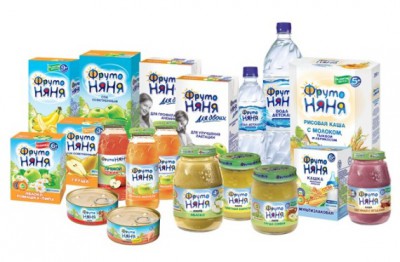
Humana, Germany
The German brand Humana produces a wide range of dairy products for newborns: dairy and hypoallergenic mixes, nutrition for premature babies, dairy-free soy mixture, health food, mixtures with diarrhea, constipation, regurgitation and vomiting, as well as cereals, milk products, puddings, teas. All products are created in Germany and controlled by 2 scientific centers. Human brand milk formulas are made only from fresh natural milk, as close as possible to the mother's milk, correspond to physiological needs babies and adapt for good absorption.
Humana Group owns dairy farms and agricultural enterprises, which allows to control the quality of raw materials with particular care. The company strictly monitors the health of animals and the quality of feed, preventing the addition of GMO products and chemical ingredients. Manufactured products are created in the course of close cooperation with children's nutritionists and pediatricians. Final testing is carried out by independent laboratories confirming the quality of children's dairy products.
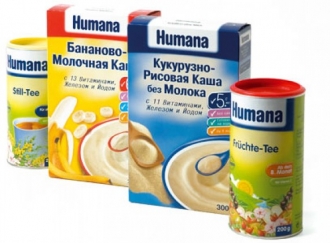
Gerber (Gerber), USA
The brand belongs to the concern Nestle. The company's products are distinguished by the highest quality of raw materials, the use of advanced technologies and a wide range. Gerber brand produces juices, vegetable, meat, fruit and cereal, vegetable and fruit purees, dairy desserts. Made from only natural, carefully selected products, delicate and aromatic, without the addition of preservatives, flavors, GMOs, flavor enhancers, dyes and stabilizers, baby food Gerber is the perfect first lure and will diversify the baby's diet.
Gerber brand baby food is packed in special tempered glass jars. All products are manufactured using a special technology, in which microbes are destroyed, and the taste and nutritional value of products are preserved. The quality of raw materials is controlled, starting from the field or farm, and continues through to the final product.
![]()
Heinz (Heinz), USA
Heinz brand produces cereals, mashed potatoes, soups, cookies, puddings, noodles, various teas, etc. The American company produces hypoallergenic products, uses only high-quality, natural raw materials without the addition of preservatives, flavors, GMOs, flavor enhancers, dyes. Multistep quality control includes all stages of the production of baby food, including farmers' fields. Ecological purity of vegetables, cereals and fruits is imperative.

Hipp, Germany
The German brand HiPP produces a wide range of baby food: milk and hypoallergenic mixes, tea drinks, juices, vegetables, meat, meat and vegetable and fruit purees, cereals, cookies, etc. The main secret of the highest quality and absolute safety of the HiPP brand is organic cereals, vegetables, fruit, meat and milk. All raw materials are grown in environmentally friendly conditions, without the use of GMO products and chemical ingredients only by traditional methods. Each jar with baby food Hipp is subjected to 260 control checks at all stages of production.

Nestle (Nestle), Switzerland
Concern Nestle produces high-quality baby food for children different ages: dairy mixes, cereals, purees, juices, etc. The company has its own laboratories and research centers, its products are traditionally of high quality, for the production of which proven technologies and only high-quality, natural raw materials are used. Nestlé's baby food is enriched with prebiotics, vitamins and minerals.
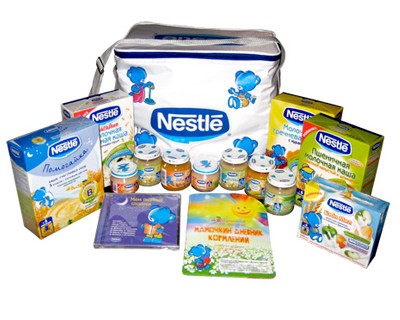
NAN (Nan)
Specialists of the Nestle concern, taking into account the needs of newborns, developed NAN blends that allow you to properly form the baby’s immune system and keep it in the future at the proper level. The NAN baby food line includes various mixtures: hypoallergenic, fermented milk for the prevention of dysbacteriosis, special for premature babies, for digestive disorders, colic and constipation.
Nestogen (Nestozhen)
The Nestle concern also offers Nestogen infant formulas, enriched with a complex of prebiotics, which support the normal intestinal microflora, promote comfortable digestion and prevent the development of constipation. In the manufacture of Nestogen mixtures, a complex technology is used, as a result of which the protein fractions of cow's milk change dramatically due to the partial or complete replacement of casein with whey protein.
Grandma's basket, Russia
Grandma's brand Lukoshko produces a wide range of products: milk mixtures, various meat and vegetable purees, cereals, juices, nectars, herbal teas. Baby food is produced at the Faustovo plant, which is equipped with the latest equipment that allows you to keep all the useful and nutrients and an innovative quality control tracking system, which is the key to high quality products. Products Grandma Lukoshko completely natural, healthy and tasty, without the addition of preservatives, flavors, GMOs, flavor enhancers, dyes. For their preparation uses only natural raw materials brought from environmentally friendly areas.

Friso (Friso), Holland
Baby food Friso is represented by dairy mixes and cereals, is enriched with all the necessary vitamins and trace elements, has a natural composition, balanced nutritional value, taking into account the needs of children of different ages. For its manufacture uses only high-quality, natural raw materials without the addition of preservatives, flavors, GMOs, flavor enhancers, dyes. The composition includes prebiotic fibers that stimulate the growth and activity of beneficial intestinal microflora. The brand strictly monitors the quality at all stages of production and cooperates with large clinics.
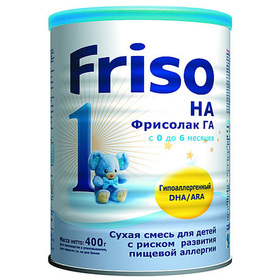
Bebi, Slovenia
Baby food brand Bebi includes milk formula, cereals, teas and cookies. Bebi porridges are designed for babies from 4 months, have a delicate taste and delicate fruit aroma, are made from environmentally friendly ingredients on modern equipment, combine vitamins and minerals. All products are under strict quality control at all stages of production, and meet strict dietary and medical requirements.

Nanny, New Zealand
Nanny - this milk formula is made from goat milk and is intended for children with intolerance to cow's milk and soy protein. It is produced in New Zealand from fresh goat milk using a special technology that preserves its biological value. Nanny can be used as a surrogate. breast milk, and for the preparation of various dairy dishes: cereals, cocktails, desserts, cottage cheese and dairy products.
Meat mashed potatoes are a source of animal protein, iron, B vitamins and other nutrients that a growing child needs. Of course, most of these substances are in vegetables and fruits, but vegetable proteins differ from animals in their composition of amino acids and cannot replace them. And the necessary amount of iron the baby can acquire only from meat: from cereals and vegetables, the body takes 2−3% of iron, and from beef, for example, 17−22%.
If you deprive the baby of meat, it can lead to a lag in growth and development, impaired attention and serious disruptions in the functioning of the gastrointestinal tract.
First spoon
Before you enter the meat lure, you should consult with a pediatrician. As a rule, familiarity with the meat to be baby in 6−7 months. This is due to the fact that only by half a year the children's gastrointestinal tract is able to fully digest. meat products and it is at this age that the child needs more iron than it can get from milk, mixes, vegetables, and fruits.
The first portion, which can be given crumbs, - 5 g (1 teaspoon); every day add one more and bring daily rate to 25−50 g. This is the optimal daily portion of meat for a child aged 6 to 9 months. By the year a baby can be given up to 70 g, but not more, because overfeeding with meat can overload the kidneys, liver and pancreas.
Little gourmet
Rabbit meat has a therapeutic effect in many diseases of the gastrointestinal tract and is almost completely absorbed by the body (96%).
What meat puree will be the most useful - the doctor will tell. Healthy kids can eat any kind of beef, pork, lamb, and even horse meat. The only thing that should not be abused is veal and other "young" meat: it can provoke an allergy. Children prone to allergies and diseases of the gastrointestinal tract, it is better to eat dietary hypoallergenic species: rabbit and turkey.
If the mashed potatoes are thick and the baby hardly swallows it, add a little milk or infant formula.
Quality control
Baby mashed potatoes are made from meat of the highest grade only. Meat, whether it be pork, beef, horsemeat or poultry, undergoes the strictest quality control. Each jar is 40–70% pure meat (depending on the manufacturer), the rest is vegetable oil, natural spices and additives.
Meat puree are three degrees of grinding, each for a baby of a certain age. Homogenized purees are suitable for the smallest (after 6 months): they are completely liquid, meat fibers are not felt, you can simply swallow them. Purebreads are designed for 8−9 months, and after 9−10 months, finely ground mashed potatoes will suit: they can already chew it, developing a chewing apparatus.

Attention: supplements!
It is no secret that the jar with baby meat puree contains not only the specified type of processed meat. Manufacturers add "seasonings" to taste. If you see sugar, salt, vegetable starch, dill, parsley and celery on the label, there is no cause for concern. Greens stimulates the production of digestive enzymes and helps the baby properly digest the mashed potatoes. Moreover, greens contain substances (phytoncides) that have antimicrobial properties: they strengthen the immune system and protect the intestines. The remaining components are used to enhance the taste and create the desired consistency of the product. They are also safe for the health of the child.
If there is a “Bio” badge on a jar with baby food, this is a guarantee that the product was manufactured in accordance with the strict requirements of environmental cleanliness standards.
It is important that the composition of the meat puree was not:
- GMO (genetically modified organisms);
- artificial colors;
- artificial flavors;
- artificial flavor enhancers.
Most of the harmful additives denoted by the letter "E". Therefore, pay attention to the meat puree label.
Analysis of the composition
With the addition of oil.
Expert commentary. Vegetable oils are an indispensable source of fatty acids, vitamin E and lecithin, which are very important for the proper development of the body of the baby and the work of his gastrointestinal tract. Manufacturers of baby food, as a rule, use sunflower oil, olive or corn.
If there is no sugar, salt and flavorings in the meat puree, the baby will initially get used to the taste of natural meat.
Does not contain salt.
Expert commentary. Most of the baby meat purees do not contain salt, and this is absolutely correct. The fact is that the body of the baby is not strong enough to maintain the correct water balance, and salt makes it difficult to remove the liquid. Moreover, excessive salt intake can lead to the occurrence of hypertension.
Gluten free.
Expert commentary.Gluten is a protein that is present in cereals, such as wheat, barley, rye, and oats. The potential danger of this substance is that gluten can cause allergic reactions in babies. Producers carefully choose cereals for the composition of children's jars and prefer buckwheat, corn or rice - only these varieties do not contain gluten.
Without GMO.
Expert commentary.Genetically modified organisms and products with their content are dangerous for the work of the digestive organs and nervous systemthey also provoke the development of allergies and skin diseases. The use of GMOs in the production of baby food is strictly prohibited, and strict control is exercised by law.
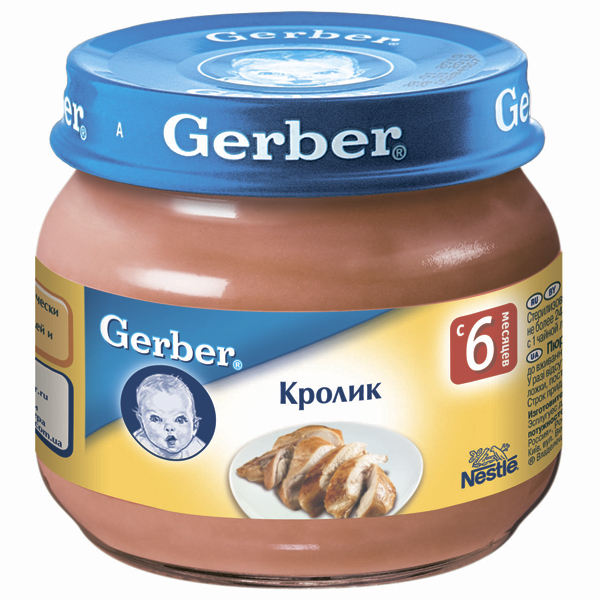
baby meat puree "Rabbit" Gerber
From 6 months
- Sterilized.
- Does not contain: GMO, artificial preservatives, dyes, flavors.
- Ingredients: rabbit meat puree, starch, vegetable oils.

"Beef. Meat Puree "" Tyoma "
From 6 months
- Homogenized.
- Sterilized.
- Does not contain: preservatives, gluten.
- Ingredients: beef, sunflower oil, potato starch.

baby meat puree "Turkey" Semper
From 6 months
- Sterilized.
- Does not contain: GMO, artificial preservatives, dyes, flavors, gluten.
- Ingredients: turkey meat (60%), rice flour, rice starch, vegetable oil, water.
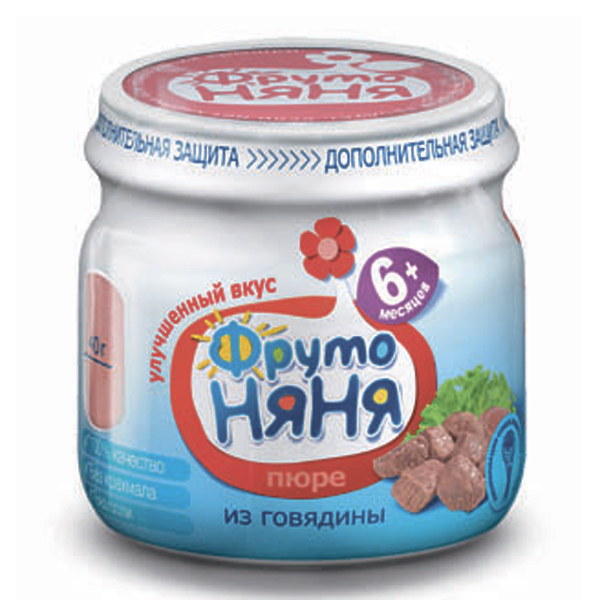
baby "Beef Puree" "FrutoNyanya"
From 6 months
- Homogenized.
- Sterilized.
- Does not contain: GMO, artificial additives, preservatives, dyes, starch, salt.
- Ingredients: beef (55%), water, thickener - rice flour (not more than 5%).

baby puree "Tender Indian" Heinz
From 6 months
- Does not contain: GMO, milk, gluten, dyes, preservatives, flavoring additives, salt
- Ingredients: turkey, corn starch, vegetable oil, water for cooking.

baby puree "Beef" "Agusha"
From 6 months
- From natural ingredients.
- Homogenized.
- Sterilized.
- Does not contain: GMO, preservatives, dyes, artificial additives and spices.
- Ingredients: beef, vegetable oil, thickener - corn starch, drinking water.
baby meat puree "Turkey" Hip
From 8 months
- Mashed potatoes on a meat and vegetable basis.
- From products with low allergenic properties.
- Canned
- Does not contain: GMO, milk protein, thickeners, gluten, preservatives, dyes, flavors, salt.
- Ingredients: turkey (40%), water, rice, boiled onions.
If for any reason you do not include meat dishes in your diet (for example, stick to a vegetarian diet) and wish to find an equivalent substitute for a meat product (for roasting a baby), consider: you will not find onebecause meat is rich in amino acids that contribute to the formation of children's intelligence.
In addition, meat products, prevent iron deficiencythereby preventing the development of diseases such as iron-deficiency anemia, rapid excitability, immunodeficiency and the appearance of dryness in the mucous membranes.
It is worth noting that the stock of iron that the baby received, being in the womb, as a rule, is depleted by six months, as a result of which there is an urgent need for the introduction of meat. Even a product such as soy cannot fully replace meat products, including baby meat puree, fully, so remember: make a child a full diet without meat is impossible.
Moms who want to buy baby meat puree to their offspring who have reached the age of six months will not regret their choice, because products that contain meat ingredients are irreplaceable sources of protein and iron. In addition, using mashed potatoes, combining meat with vegetables and various cereals, the child learns a range of diverse taste sensations.
By purchasing ready-made meat puree for children, you can add to other dishes: soups, cereals, potato dishes, etc. You can also take ready mashed meat for a walk or a short trip.
Choosing baby meat puree? Pay attention to its manufacturer!
If you think about which meat puree is better - cooked at home or purchased, then note that puree made at the factory, as a rule, does not contain salt (thanks to which children's body iron absorbed in meat is better absorbed) and enriched with such vitamins like C and B. You should not experiment with the health of the child and buy questionable products, even if the price is very tempting.
To date the best baby food manufacturers There are many brands, and to buy baby meat puree of these manufacturers is best in many supermarkets and shops. Now we will present to your attention the manufacturing companies that have gained a reputation in the Russian baby food market.
When it is necessary to introduce meat puree into the children's diet
If the baby does not have an allergy to the protein contained in milk, then you can offer the baby mashed meat beef or vealand if there is, then start feeding with pork or rabbit.
If you are afraid that your baby may experience an allergic reaction to meat products, do not enter beef or chicken into the diet, better prepare (or purchase) mashed meat piglet, lamb, turkey or rabbit.
Note: baby meat puree is introduced into the diet of babies after vegetable puree, i.e. starting from the sixth to the seventh month. Initially, the baby must be offered to test half a teaspoon of product and every day to increase the dose by half a spoon in such a way that by the eighth month the baby consumed 150 grams. meat product.
Due to the fact that puree of different brands have three degrees of homogenization (chopping), if you want to buy baby meat puree, the site advises to choose a homogenized puree, corresponding to the age of your baby:
- at the age of 6-7 months, the baby should be offered homogenized purees,
- from 7-8 months - mashed figurative,
- and from 9-12 months - coarse puree.
How to cook meat puree for the child on their own
If you want to cook meat puree for your child by yourself, choose such diet meats as: chicken, veal, lamb and turkey. If you do not know how to cook meat puree for your baby, get acquainted with the following recipe.
Recipe meat puree for children under one year
Take 50 ml of water, 40 gr. beef and 1 teaspoon butter. Wash the meat, remove bones and tendons from it, then cut into small cubes and, putting in a saucepan, simmer until tender. Cool the cooked meat and mince, then grind with a blender.
Add 50 ml of broth to puree, season with a little salt and add a teaspoon of butter. Ready mashed potatoes mix thoroughly. Having prepared baby meat puree, you can regale a little gourmet 🙂
